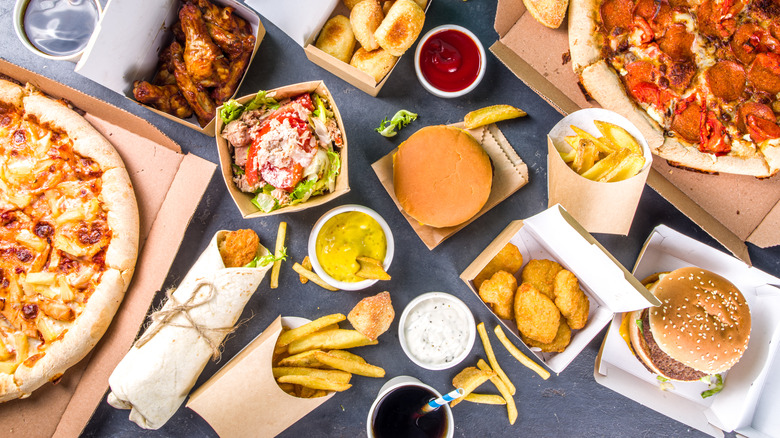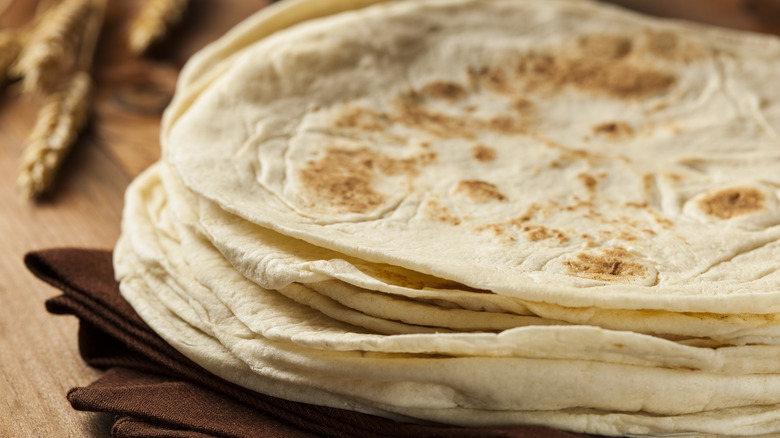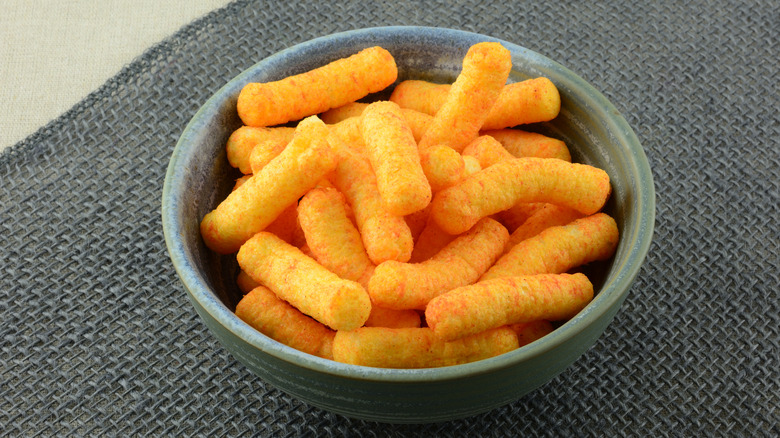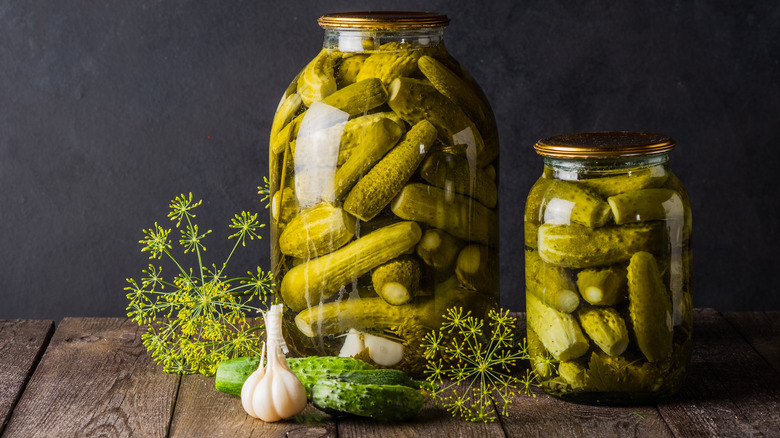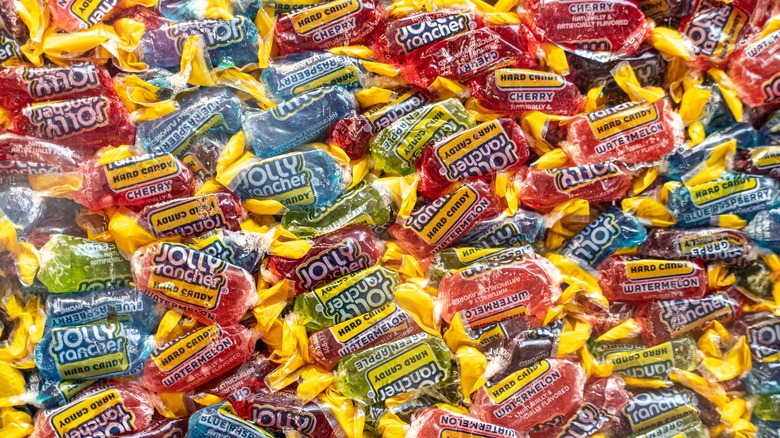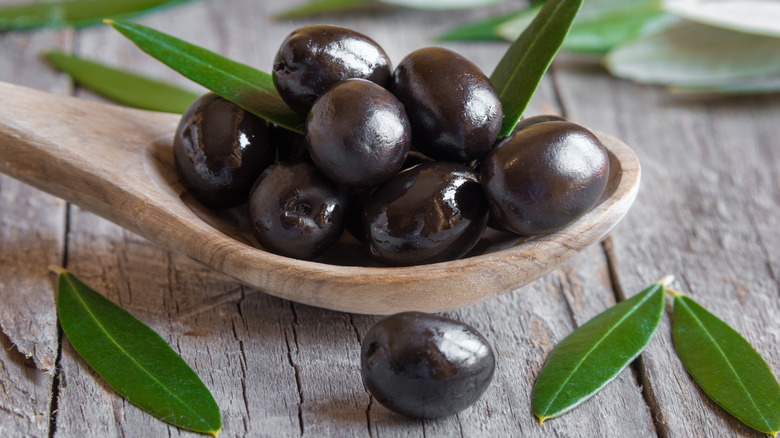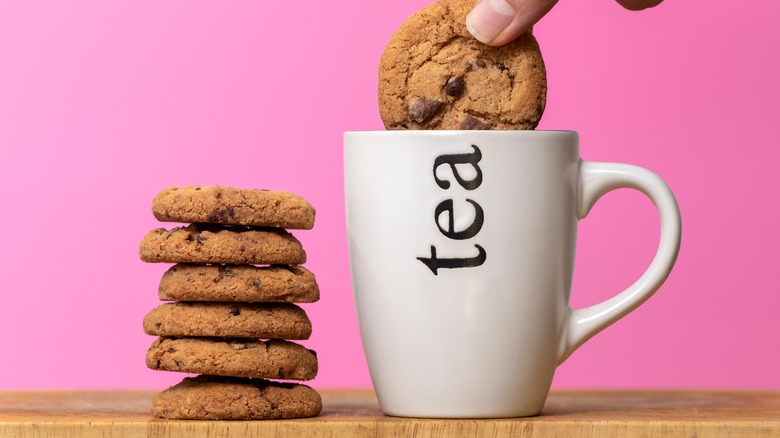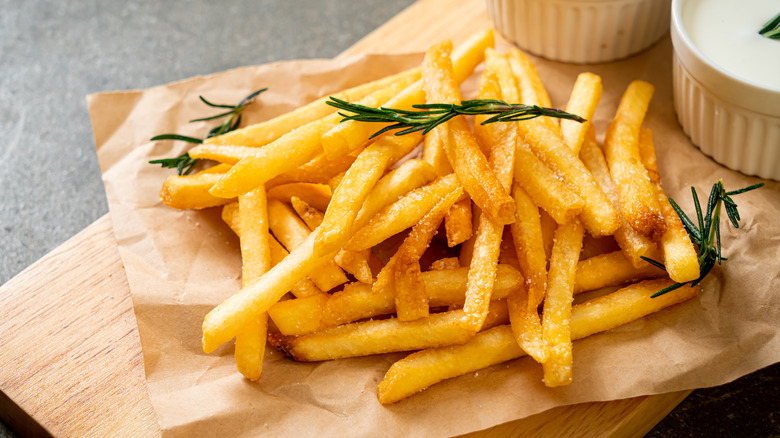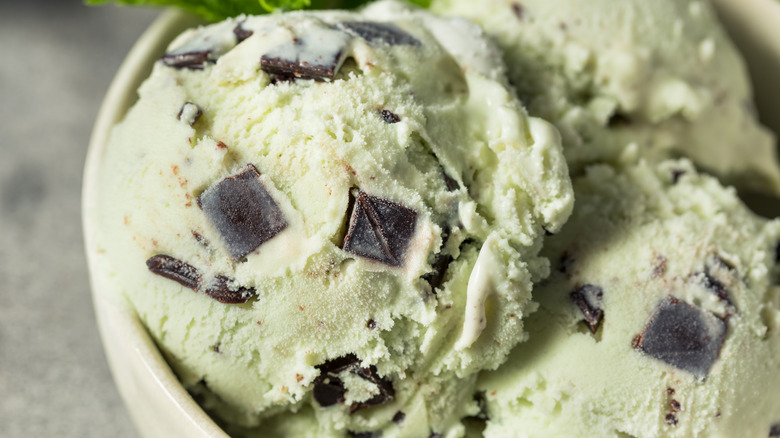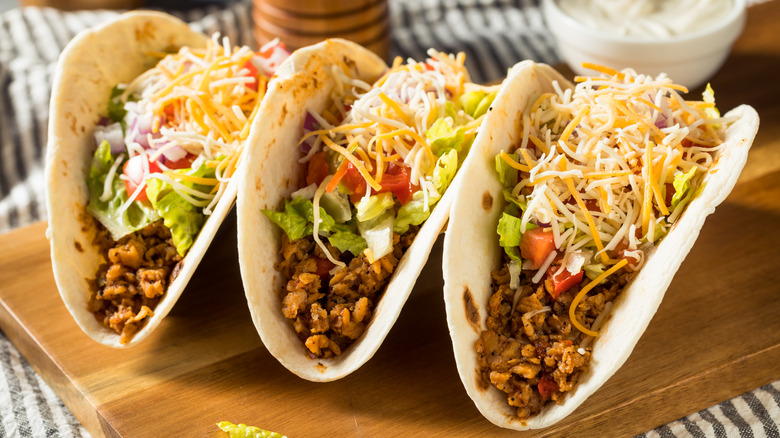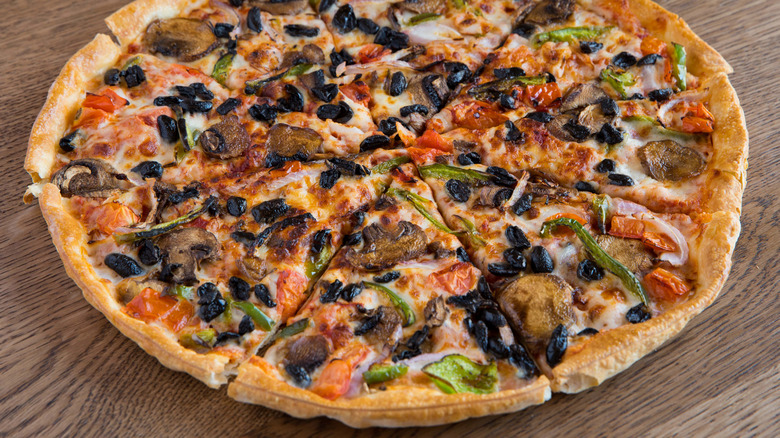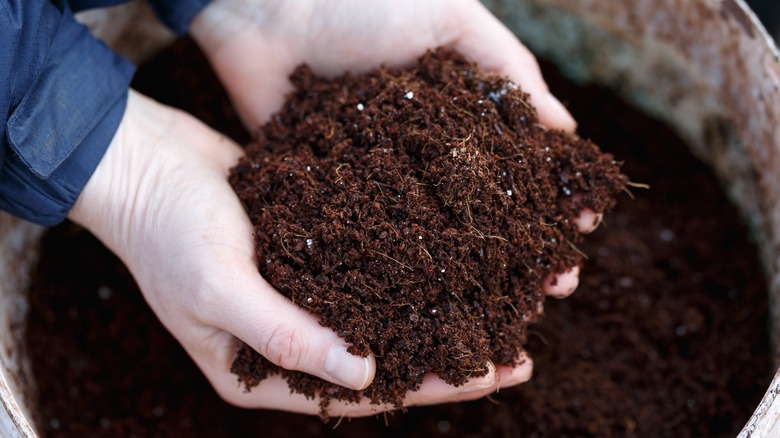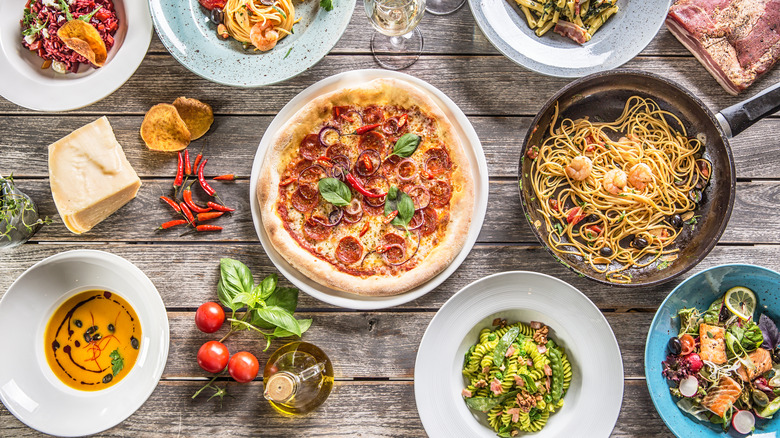Really Weird Last Meal Requests Inmates Made On Death Row
The concept of a last meal before death has debatable origins, but many experts believe it began in ancient Greece. Since then, condemned criminals have taken part in the ritual of dictating their final dining experience around the globe. Here in the U.S., a death row inmate's last food order before execution has become a bizarrely fascinating pop culture phenomenon. True crime fans and others who follow high-profile cases are often curious to know which foods prisoners select for this ever-important final meal.
Rules about last meals vary widely by state, with some jurisdictions allowing inmates to select anything they like and others imposing strict limitations. For example, Florida limits last meal requests to $40 worth of locally-purchased food, as Florida Department of Corrections spokesperson Jessica Cary told The Orlando Sentinel. In states where inmates have freedom of choice, a 2012 study published in the journal Appetite showed that most opt for fried foods, hamburgers, and their favorite desserts.
However, recent history is full of prisoners whose selections were random, symbolic, or downright strange. These weird last meals are discussed long after the executions, remaining as memorable as the criminals themselves and becoming an integral part of their death row story.
Charles Rumbaugh kept it simple
Given the choice of any food imaginable, it's easy to see why many of the condemned choose extravagant meals. However, Charles Rumbaugh had very different ideas about what constituted a proper last meal. Convicted of a 1975 robbery and murder at age 17, Rumbaugh spent nearly a decade in prison before facing execution. He was a troubled young man, but his final dinner order was surprisingly straightforward: Rumbaugh chose to eat a single flour tortilla before his execution.
Flour tortillas are an excellent vehicle for almost any filling and have a simple flavor that compliments various cuisines. That straightforward taste means people rarely eat flour tortillas alone. However, the only thing Rumbaugh enjoyed with his single tortilla was a glass of water, the plainest drink imaginable.
Still, as researcher David Tomsovic explained to Deseret News, Rumbaugh's seemingly strange but simple choice accurately reflected the young man's desires at the time. He didn't feel the need for an extravagant meal, so he chose not to have one. Tomsovic chalks this decision up to the prisoner's philosophical nature, which is a sound theory. After all, Rumbaugh likely had much bigger things on his mind than food in his final days.
Velma Barfield chose snacks
Snack foods are undoubtedly delicious, but they're not an excellent substitute for a full meal, especially if it's the last one a person will ever eat. Most people probably wouldn't dream of raiding a vending machine for their final dinner in prison, but that's precisely what Velma Barfield wanted to do before her 1984 execution. Like many prisoners, she had the option of ordering a special final meal. Even though she could have opted for something more filling, Brafield elected to have a single can of Coca-Cola and a bag of Cheeze Doodles before her death by lethal injection.
Her reasons for this choice are unclear, but the North Carolina prison in which she served her sentence honored the request. The inmate — who was 52 at the time — enjoyed her final snack shortly before her execution. Barfield received a life sentence after poisoning at least four people, including her boyfriend. Although she made attempts to appeal her conviction, those appeals ultimately failed. When she died, she became the first woman executed in the U.S. since 1962 and the first female prisoner to die by lethal injection.
Kenneth Wayne Morris celebrated one last birthday
Kenneth Wayne Morris' 38th birthday was definitely his worst, given that it coincided with his execution date. So when it came time to choose his last meal, the Texas prisoner decided on something seemingly weird but fitting: birthday cake. Specifically, Morris asked for a white cake with lemon icing to celebrate the occasion. This festive food choice is ironic under the circumstances, but the unfortunate execution date coincidence meant this was Morris' last chance to enjoy cake before his death. Along with his birthday dessert, the prisoner ate fried chicken and fried okra. Although inmates sometimes eat their last meals the night before their execution, the Texas prison served Morris his lunch and birthday cake midday and executed him early that evening.
Before landing on death row, Morris was a career criminal with a long history of burglaries that sometimes escalated to violence. His final crime was a home invasion that ended in the senseless murder of one of the homeowners. Although his two accomplices received lighter sentences, Morris received the maximum penalty for committing the murder. He spent approximately 15 years in prison before exhausting all his appeal options at the state and U.S. Supreme Court levels.
Stacey Lawton loved a certain burger topping
Hamburgers are a popular last meal choice, especially when paired with French fries and popular toppings. However, in 2000, one Texas inmate demonstrated an evident love for a particular burger topping and made an unusual last meal request to get it. Convicted murderer Stacey Lawton's last meal consisted of a traditional cheeseburger and fries, but he topped off the order with an entire jar of dill pickles. Although dill pickles' salty, sour flavor makes them a great accompaniment to burgers and other fast food items, most people would likely struggle to eat a whole jar in one sitting. However, Lawton clearly felt that his last meal wouldn't be complete without a massive helping of them.
On the day of his crime in 1992, police apprehended Lawton and his two accomplices after a high-speed chase in a stolen pickup truck. Lawton received a death sentence for shooting a man outside his home in the middle of a robbery. Although Lawton claimed he wasn't the shooter, courts denied his conviction appeals throughout his seven years on death row. He was one of many inmates executed in Texas that year, but his last meal is arguably the most memorable.
Gerald Lee Mitchell dined on candy
Many people can easily eat a whole bag of their favorite candy in one sitting, but few would consider candy a suitable meal option. However, a Texas death row inmate named Gerald Lee Mitchell thought candy was the perfect choice for him. Mitchell chose an entire bag of assorted Jolly Rancher candies when prison officials asked what he wanted for his last meal. Although this hard candy has maintained a loyal following since it hit shelves in 1949, it's difficult to imagine any prisoner selecting it as the final meal they'll ever eat.
However, the arguably childlike choice may have had some significance to Mitchell, who was only 17 when he murdered three people with a shotgun. He openly admitted to his crimes, and courts sentenced him to death for the murders. Although his lawyer appealed his conviction based on his age at the time of the crimes, a death sentence was legally appropriate for a 17-year-old in Texas. As a result, Mitchell spent nearly half his life on death row before being executed when he was 33 years old. Whether or not he finished eating the whole bag of Jolly Rancher candies before his execution is uncertain.
Victor Feguer ate light
The motivation behind many death row inmates' last meals is a desire to enjoy their favorite comfort foods one more time. However, some prisoners rely on philosophy instead of taste when it comes to making their final meal choice. Take Victor Feguer, who faced execution in 1960s Iowa for kidnapping and murdering a local doctor. He remained free for only 11 days before police found and captured him, after which he readily confessed to his crimes. Feguer has the unique distinction of being the last criminal ever executed in Iowa, which officially abolished capital punishment in 1965.
When the time came to select his last meal, Feguer made a strange request: one solitary olive with the pit intact. Olives — or at least olive branches — are often taken as a sign of peace, which largely influenced Feguer's choice. Reports indicate that the prisoner specifically asked for an olive with its pit because he hoped an olive tree would grow from his grave. The prison staff granted his simple request not long before his execution, and officials later found the olive's pit in the criminal's burial suit. Although the meal may have felt spiritually appropriate to Feguer, he certainly missed out on enjoying tastier, more satisfying food options. Nevertheless, his last meal still fascinates many who study the habits of condemned prisoners.
John William Elliot was very specific
When facing their own execution, some criminals put seemingly very little thought into the specificity of their last meal. Instead, they rattle off a list of items they'd enjoy or perhaps select one special treat in particular. However, John William Elliot's final food request was very specific. First, he ordered a cup of hot tea, stipulating that prison officials make it from tea bags. Then, Elliot asked for six chocolate chip cookies to go with his drink. Although these items make sense together as a snack, it's a strangely calculated order for a last meal.
Elliot died by lethal injection in 2003, almost 20 years after his original conviction. A Texas jury sentenced him to die for senselessly beating a young woman to death in the late 1980s after his two accomplices both testified against him. Elliot had dual British-American citizenship and only accepted interviews from British media outlets during his incarceration. Despite local support for his execution in Texas, the British public mostly opposed Elliot's conviction and sentence. His final meal of tea and cookies was perhaps a nod to his childhood, which he spent on a U.S. military base in Great Britain.
Bruno Richard Hauptmann dined on a random assortment
It can be hard for inmates to narrow their last meal order down to one concise dish, especially since the decision has so much weight behind it. So instead, many prisoners curate a selection of their favorites, including Bruno Richard Hauptmann. However, Hauptmann's meal is uniquely peculiar because many of the foods he selected don't necessarily complement each other. Hauptmann gained notoriety in the 1930s for his part in the sensational Lindbergh kidnapping case. He allegedly kidnapped the toddler Charles Lindbergh Jr. and demanded $50,000 in ransom. He later received a death sentence for subsequently murdering the boy, though he proclaimed his innocence until the end.
As was customary, prison officials allowed Hauptmann his choice of any food for his last meal. Among his selections were French fries and chicken — two items that are familiar foods on many convicts' final plates. However, he also asked for cherries, olives, buttered peas, and plain celery. This random assortment of vegetables isn't readily associated with his other meal items, and there is seemingly no rhyme or reason for these selections. Hauptmann kept things much simpler for dessert, though, as he asked for a single piece of cake.
Timothy McVeigh satisfied his sweet tooth
Childhood favorites frequently appear in last meal requests, such as when Oklahoma prisoner Timothy McVeigh asked prison officials for a beloved sweet treat. Rather than a full meal, McVeigh simply requested two pints of mint chocolate chip ice cream the night before his execution in 2001. That's a lot of ice cream to consume at one time, but an inmate's final dinner is a morbidly perfect time to indulge. Like everything else about McVeigh's short life, his last meal captured the interest of many national media outlets.
Although he only lived to be 33, it's unlikely that America will ever forget his criminal acts. In 1995, McVeigh gained enduring infamy when he bombed a federal building, earning himself the moniker of the "Oklahoma City Bomber." At the time, his crime was the most deadly act of domestic terrorism ever committed in the U.S.
After eating his strange ice cream dinner, McVeigh spent the rest of his last night alive watching television and trying to sleep. He died via lethal injection the following day. Over two decades after his death, McVeigh's actions remain a negative highlight in American history, and crime enthusiasts are still puzzled over his final meal order.
Peter J. Miniel went all out
While some weird last meals are noteworthy for their minimalism, Peter J. Miniel's order is memorable for its sheer size. Miniel violently murdered an acquaintance in 1986 and turned down a plea deal in favor of a jury trial. Ultimately, that gamble cost him his life. After the Texas Court of Criminal Appeals made his death sentence official in 1992, Miniel had over a decade's worth of prison to contemplate his last meal. When the time came to make a decision, Miniel took full advantage of his right to choose whatever he wanted to eat.
The inmate's order was among the largest in recent history and featured 14 different foods. Included in the impressive list were 20 tacos, two kinds of ice cream, 20 enchiladas, two double cheeseburgers, fried chicken, pizza, and — perhaps the weirdest of all — a fruitcake. More likely than not, this list reflected all of Miniel's favorite things from his life before prison. He also requested four beverages: orange juice, root beer, Pepsi, and Coca-Cola. Although reports don't indicate whether or not the prisoner could finish this massive feast, one thing is certain: he probably died with a full stomach.
Philip Ray Workman tried to do a good deed
Death row inmates typically select their last meals based on personal preferences, but Philip Ray Workman tried to use his final food choice as an act of redemption. Workman received a death sentence in Tennessee after shooting a police officer during a robbery in 1981. Although he expressed remorse for his crime and also raised doubts about his guilt, Workman remained in prison for over 25 years before exhausting all of his appeals. Before his 2007 execution, the inmate ordered a vegetarian pizza as his last meal, with one unusual stipulation: he wanted the pizza delivered to a random homeless person in the local area.
Unfortunately, prison officials denied his request, so Workman instead chose to forego a final meal. However, other Tennesseans took action when they learned of the inmate's surprisingly selfless choice after his execution. Multiple people raised money or ordered pizzas for homeless shelters around Nashville, feeding hundreds of people on the same day Workman died. One noteworthy example is Donna Spangler, who told CNN that she convinced friends to help her purchase $1,200 worth of pizza for Nashville's Rescue Mission. In the end, Workman's last meal request arguably became a positive example that spurred community outreach.
James Edward Smith made a spiritual choice
Some condemned prisoners elect to eat unusual things before execution, but occasionally an inmate's last meal request doesn't even include food. For example, James Edward Smith was a tarot card reader and self-proclaimed Voodoo priest who made a truly original request. He received the death penalty after murdering an office worker and made one of the most bizarre last meal orders of recent times. Instead of traditional food, Smith wanted a lump of rhaeakunda dirt to use in a ritual that he believed would help his spirit pass on after death. It's hard to imagine someone choosing dirt as the last thing they'll ever taste, but Smith was fully committed to his choice.
Unsurprisingly, dirt wasn't considered food by prison officials, who quickly denied Smith's request. Unable to have his first choice of meal, Smith instead settled for another seemingly random selection: a single cup of pre-packaged yogurt. Neither option would be particularly satisfying for most diners, but yogurt undoubtedly has a better flavor than dirt. Nevertheless, Smith wanted to be sure the prison officials would regret turning down his request. Right before his death, he reportedly warned guards that his spirit would haunt the prison for 300 years.
Lawrence Rusell Brewer ruined it for everyone
While most inmates order their last meals out of a desire for familiarity or enjoyment, Lawrence Russell Brewer ordered his out of spite. His elaborate request included: a triple bacon cheeseburger, a meat lovers' pizza, three root beers, peanut butter fudge, ice cream, an omelet, fried okra, a pound of barbecued meat (unsurprising in Texas), and a double order of chicken fried steak. This last meal made headlines across the country not for Brewer's choices but for his bizarre response to receiving it: he refused to eat a single bite, claiming that he wasn't hungry.
Brewer's behavior resulted in a ton of wasted food and outraged a Texas senator named John Whitmire, who helped end the longstanding practice of allowing Texas inmates to request last meals. Thanks to Brewer, death row inmates in the state haven't had the privilege of choosing their last meal since 2011.
Given Brewer's heinous final crime and long history of prior offenses, it's no surprise that he only thought of himself. In 1999, Brewer received a death sentence following the brutal 1998 murder of James Byrd, Jr., which Brewer committed as part of a racially-motivated hate crime.
